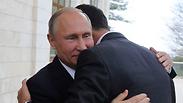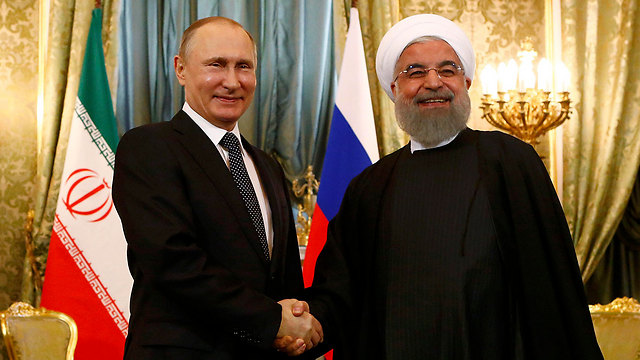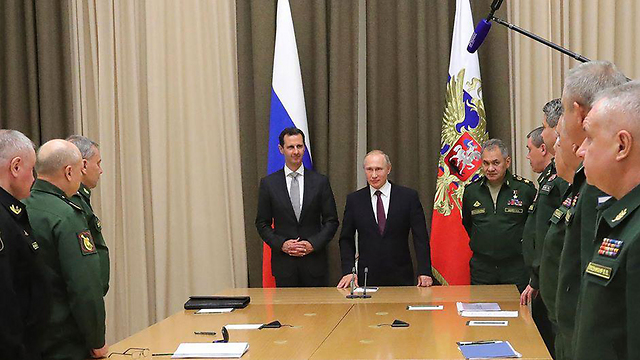
Putin and Assad in Sochi, Tuesday

Why Russia must take Israel’s interests in Syria into account
Analysis: As Putin, Rouhani and Erdogan meet in Sochi to divide Syria into spheres of influence, Israel remains the leading element capable of spoiling the party. The day the Iranian-run airport in Syria is erased, all agreements will go up in the flames ignited on the Israeli-Syrian border.
Visiting Sochi on Tuesday, Syrian President Bashar Assad looked like a child sent into a room for a moment to thank his uncles for the gifts he received from them, as he stood there all alone and lost, surrounded by the Russian security echelon.

That one image—which was distributed by the Kremlin, by the way—reflects Syria's situation and the permanent agreement the Russians are concocting for the country, and largely for Israel too.
Assad's trip to Russia on Monday was kept secret. He likely arrived on a Russian military aircraft, without an entourage, and even without his own interpreter. At first, he met with Russian President Vladimir Putin for three hours. Then he got caught in an event that had nothing to do with his visit.
Putin’s schedule includes a periodical meeting with the security echelon for discussions on the Russian army’s purchase plans. The defense minister was there, along with the chief of staff, the security industry heads and the heads of the military branches. Foreign leaders don’t enter these meetings, which are run by Putin. The Russian president simply dragged Assad into the room to recite the required words of gratitude.
“I would like to introduce you to the people responsible for the success in Syria,” Putin explained to Assad and to the cameras, pointing at the meeting attendees. “As you know, apart from Turkey and Iran, we work intensively with other countries as well: With Egypt, the United States and Jordan.” Which country was excluded from the list of countries Russia works with intensively? Israel.
But the most important diplomatic development concerning the Syrian issue will take place in Sochi on Wednesday in the summit organized by Putin with Iranian President Hassan Rouhani and Turkish President Recep Tayyip Erdogan, where Syria will be divided into spheres of influence. That’s where the loot will be divided. The US isn’t part of it, and neither is Syria. Assad hasn’t been invited to the meeting.
While Assad sees the Turkish invasion of northern Syria as hostile involvement, Putin has made it clear to him that, as part of the spheres of influence division in the permanent agreement in Syria, Turkey will be getting responsibility and influence over areas in the northern part of the country.
The Russians see Turkey as their trojan horse in NATO. Erdogan is also offering Putin his ability to influence the moderate opposition forces, like the Free Syrian Army which is based in Turkey. Turkey, on its part, sees Russia as the only ally capable of maintaining its interests against hostile elements like the Kurds and against the infiltration of refugees into its territory.

Putin and Rouhani, earlier this year. The most important diplomatic development concerning Syria will take place in Wednesday’s summit (Photo: Reuters)
The Iranians will receive Damascus, a considerable part of the Syrian army systems, inhabited by pro-Iranian militias and Hezbollah men. The Iranians basically control the Syrian army. So despite the conflict of interests, the Russians will receive the Assad regime’s stability from the Iranians.
Russia will start diluting its forces in Syria till the end of the year and will remain with reduced forces in western Syria along the coast, where the Russians will have a limited aerial deployment and a changing naval deployment, as well as a defense system for these forces. That is also what the Russians will bring to the permanent agreement talks in Geneva. The Americans, who are allegedly leading the talks, are being updated at best by the Russians and are only waiting for the moment they can get out of Russia.
Assad is a marionette. And what about Israel? It will have to take care of its interests on its own. As part of the Russian attempt to soften Foreign Minister Sergei Lavrov’s statement on Iran’s right to remain in Syria, the Russian ambassador to Israel announced Tuesday that Russia was taking Israel’s interests in Syria into account. The Russians should do so, as Israel is the leading element that could spoil the party.
If Israel decides that it considers permanent pro-Iranian Shiite forces in Syrian military camps as a “red line” and bombs them, the Russians will have to explain to their Iranian allies why they are failing to control the Israelis. The day the Iranian-run airport in Syria is erased, all agreements will go up in the flames that will be ignited on the Israeli-Syrian border.
















